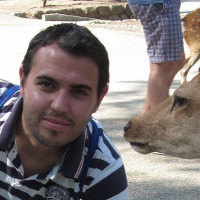
 Background.
I am currently a Professor at the School of Computer Science and Informatics at Cardiff University.
I am also a UKRI Future Leaders Fellow since 2021, and co-founded the Cardiff NLP group in 2020.
Before joining Cardiff University, I was a Google Doctoral Fellow and PhD student
at the Linguistic Computing Laboratory (LCL) of Sapienza University of Rome.
My background education includes an Erasmus Mundus Master in Natural Language Processing and Human Language Technology and a 5-year BSc degree in Mathematics.
I also worked for a year as a research engineer at ATILF-CNRS in Nancy (France).
Background.
I am currently a Professor at the School of Computer Science and Informatics at Cardiff University.
I am also a UKRI Future Leaders Fellow since 2021, and co-founded the Cardiff NLP group in 2020.
Before joining Cardiff University, I was a Google Doctoral Fellow and PhD student
at the Linguistic Computing Laboratory (LCL) of Sapienza University of Rome.
My background education includes an Erasmus Mundus Master in Natural Language Processing and Human Language Technology and a 5-year BSc degree in Mathematics.
I also worked for a year as a research engineer at ATILF-CNRS in Nancy (France).
Research.
I work on various topics in Natural Language Processing (NLP), including language understanding and applications.
I've written a book on Embeddings in NLP with Taher Pilehvar, where we give an overview of the recent trends in distributional semantics and NLP.
These last years I have been particularly interested on how relational knowledge is captured in current NLP models
(embeddings/language models - check out our latest RelBERT model!), and how this plays a role in applications.
During my PhD I've also worked on integrating explicit knowledge (mainly from lexical resources) into downstream NLP applications, with a special focus on multilinguality and ambiguity.
Given the prominence of Large Language Models (LLMs), I've been interested in how to use them for applications. Particularly, how they manage to capture culture or language-specific nuances
- check out our recent CREHate (best resource paper award at NAACL 2025)
and BLEnD projects!
Open data.
I strongly believe that well-curated datasets and resources, as well as shared tasks, are key for advancing science.
In 2019 we organized the WiC challenge on evaluating context-sensitive representations.
This competition was part of a shared task in the IJCAI workshop SemDeep,
and was featured in the SuperGLUE language understanding benchmark.
More recently, I've co-organised a SemEval task on Tabular Data Question Answering.
Finally, I have also been working on social media applications recently, check out the TweetNLP platform! We also have open datasets
(TweetEval), time-specific models (TimeLMs), and
multilingual language models (XLM-T).
In addition to releasing these social media resources and NLP tools, I'm interested in how NLP can be used in different applications, especially socially-related ones.
Other.
NLP aside, I love travelling and sports. I was raised in Granada, a wonderful city in the south of Spain where I spent the first 20 years of my life. Then, I have been living in large European cities like Paris, Barcelona and Rome, and spent long amounts of time in Seoul. I have also lived in other smaller (but equally charming) cities: Nancy and Besançon (France) and Wolverhampton (UK).
I like practising all kinds of sports: football, swimming, tennis, padel, ping pong... and chess (yes, it is also a sport!).
I hold the International Master chess title and am currently the Welsh chess champion
and top-ranked player.
Teaching and Supervision:
You can find more about my current teaching and PhD supervision here.
Note: If you are interested in doing a PhD with me, please read this note to prospective PhD students.
| Joanne Boisson, Zara Siddique, Hsuvas Borkakoty, Dimosthenis Antypas, Luis Espinosa Anke, Jose Camacho-Collados. Automatic Extraction of Metaphoric Analogies from Literary Texts: Task Formulation, Dataset Construction, and Evaluation. [paper] [data] COLING 2025, Abu Dhabi, UAE. |
| Nayeon Lee, Chani Jung, Junho Myung, Jiho Jin, Jose Camacho-Collados, Juho Kim, Alice Oh. Exploring Cross-Cultural Differences in English Hate Speech Annotations: From Dataset Construction to Analysis. [paper] [data] NAACL 2024, Mexico City, Mexico.  |
| Aleksandra Edwards, Jose Camacho-Collados. Language Models for Text Classification: Is In-Context Learning Enough? [paper] LREC-COLING 2024, Turin, Italy. |
| Dimosthenis Antypas, Alun Preece and Jose Camacho-Collados. Negativity spreads faster: A large-scale multilingual twitter analysis on the role of sentiment in political communication. [paper] [data&code] Online Social Networks and Media Journal (2023). |
| Jose Camacho-Collados, Kiamehr Rezaee, Talayeh Riahi, Asahi Ushio, Daniel Loureiro, Dimosthenis Antypas, Joanne Boisson, Luis Espinosa-Anke, Fangyu Liu, Eugenio Martínez-Cámara, Gonzalo Medina, Thomas Buhrmann, Leonardo Neves and Francesco Barbieri. TweetNLP: Cutting-Edge Natural Language Processing for Social Media. [paper] [code] [demo] EMNLP 2022 (Demo), Abu Dhabi (United Arab Emirates). |
| Daniel Loureiro, Alípio Mário Jorge and Jose Camacho-Collados. LMMS Reloaded: Transformer-based Sense Embeddings for Disambiguation and Beyond. [paper] [data&code] Artificial Intelligence Journal (2022). |
January 2025. I was the keynote speaker of the COLING LoResLM Workshop
December 2024. Hiring a PhD student with full scholarship and a postdoc, both with application deadline on January 3rd.
January 2024. I'll be the General Chair of *SEM 2024.
August 2023. We won the AIJ 2023 Prominent Paper Award!
August 2023. I've been promoted to Professor!
July 2023. Attending ACL 2023 and organising *SEM 2023 as a program co-chair.
May 2023. I'm giving an invited talk at the Natural Language Symposium at the University of Copenhagen.
January 2022. I'll give one of the keynote talks at the Global WordNet Conference.
July 2022. I'm happy to announce the first release of TweetNLP, a platform for cutting-edge NLP specialized on social media!
March 2022. We are organising the first EvoNLP EvoNLP workshop (Workshop on Ever Evolving NLP), co-located with EMNLP. EvoNLP also features a meaning shift detection shared task framed as Word-in-Context - trial data available!
February 2022. We have launched our TimeLMs, with the commitment to release a new language model every three months!
August 2021. Taher Pilehvar and I taught a week-long course on "Embeddings in NLP" at the ESSLLI summer school.


